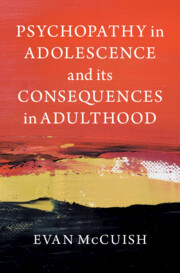Refine search
Actions for selected content:
3411444 results

Full Quantum Effects in Condensed Matter Physics
- Beyond the Born-Oppenheimer Approximation
- Coming soon
-
- Expected online publication date:
- March 2026
- Print publication:
- 28 February 2026
-
- Book
- Export citation

Resampling Asset Prices
- An Identity-Based Approach
- Coming soon
-
- Expected online publication date:
- March 2026
- Print publication:
- 31 March 2026
-
- Element
- Export citation

Determining Provenance from Compositional Data
- Coming soon
-
- Expected online publication date:
- March 2026
- Print publication:
- 28 February 2026
-
- Element
- Export citation

Ecology and Climate in Theatre and Australian Performance
- Coming soon
-
- Expected online publication date:
- March 2026
- Print publication:
- 30 April 2026
-
- Book
- Export citation

Making News in Renaissance Europe
- Coming soon
-
- Expected online publication date:
- March 2026
- Print publication:
- 31 March 2026
-
- Element
- Export citation

The Iron Curtain
- A Short History of Socialist Borders
- Coming soon
-
- Expected online publication date:
- March 2026
- Print publication:
- 28 February 2026
-
- Element
- Export citation
Introduction: Navigating Climate Justice Thought and Action
-
-
- Book:
- Seeking Global Climate Justice
- Published online:
- 09 January 2026
- Print publication:
- 28 February 2026, pp 1-17
-
- Chapter
-
- You have access
- Open access
- Export citation
Materials Management
- Coming soon
-
- Expected online publication date:
- February 2026
- Print publication:
- 31 March 2026
-
- Textbook
- Export citation
Illiberal Law and Development
- Property Rights and Conflict Over Land in China
- Coming soon
-
- Expected online publication date:
- February 2026
- Print publication:
- 28 February 2026
-
- Book
- Export citation
Contents
-
- Book:
- Seeking Global Climate Justice
- Published online:
- 09 January 2026
- Print publication:
- 28 February 2026, pp vii-viii
-
- Chapter
-
- You have access
- Open access
- Export citation

Psychopathy in Adolescence and its Consequences in Adulthood
- Coming soon
-
- Expected online publication date:
- February 2026
- Print publication:
- 28 February 2026
-
- Book
- Export citation
About the Contributors
-
- Book:
- Seeking Global Climate Justice
- Published online:
- 09 January 2026
- Print publication:
- 28 February 2026, pp 186-190
-
- Chapter
-
- You have access
- Open access
- Export citation
3 - Socio-Environmental Conflicts in Extractive Agricultural Enclaves
-
-
- Book:
- Seeking Global Climate Justice
- Published online:
- 09 January 2026
- Print publication:
- 28 February 2026, pp 57-96
-
- Chapter
-
- You have access
- Open access
- Export citation
6 - Unearthing Climate Justice in the Volatile Nature of Borneo
-
-
- Book:
- Seeking Global Climate Justice
- Published online:
- 09 January 2026
- Print publication:
- 28 February 2026, pp 141-160
-
- Chapter
-
- You have access
- Open access
- Export citation
5 - Proposals of Peasant Agriculture for Climate Change
-
-
- Book:
- Seeking Global Climate Justice
- Published online:
- 09 January 2026
- Print publication:
- 28 February 2026, pp 119-140
-
- Chapter
-
- You have access
- Open access
- Export citation
Acknowledgements
-
- Book:
- Seeking Global Climate Justice
- Published online:
- 09 January 2026
- Print publication:
- 28 February 2026, pp ix-xii
-
- Chapter
-
- You have access
- Open access
- Export citation
Index
-
- Book:
- Seeking Global Climate Justice
- Published online:
- 09 January 2026
- Print publication:
- 28 February 2026, pp 191-210
-
- Chapter
-
- You have access
- Open access
- Export citation
Dedication
-
- Book:
- Seeking Global Climate Justice
- Published online:
- 09 January 2026
- Print publication:
- 28 February 2026, pp v-vi
-
- Chapter
-
- You have access
- Open access
- Export citation
2 - North vis-à-vis South: Polar Perspectives amid a Climate Crisis
-
-
- Book:
- Seeking Global Climate Justice
- Published online:
- 09 January 2026
- Print publication:
- 28 February 2026, pp 35-56
-
- Chapter
-
- You have access
- Open access
- Export citation
7 - Climate Justice from the Perspective of Indigenous, Black, and Campesinx Leaders in Abya Yala
-
-
- Book:
- Seeking Global Climate Justice
- Published online:
- 09 January 2026
- Print publication:
- 28 February 2026, pp 161-185
-
- Chapter
-
- You have access
- Open access
- Export citation
